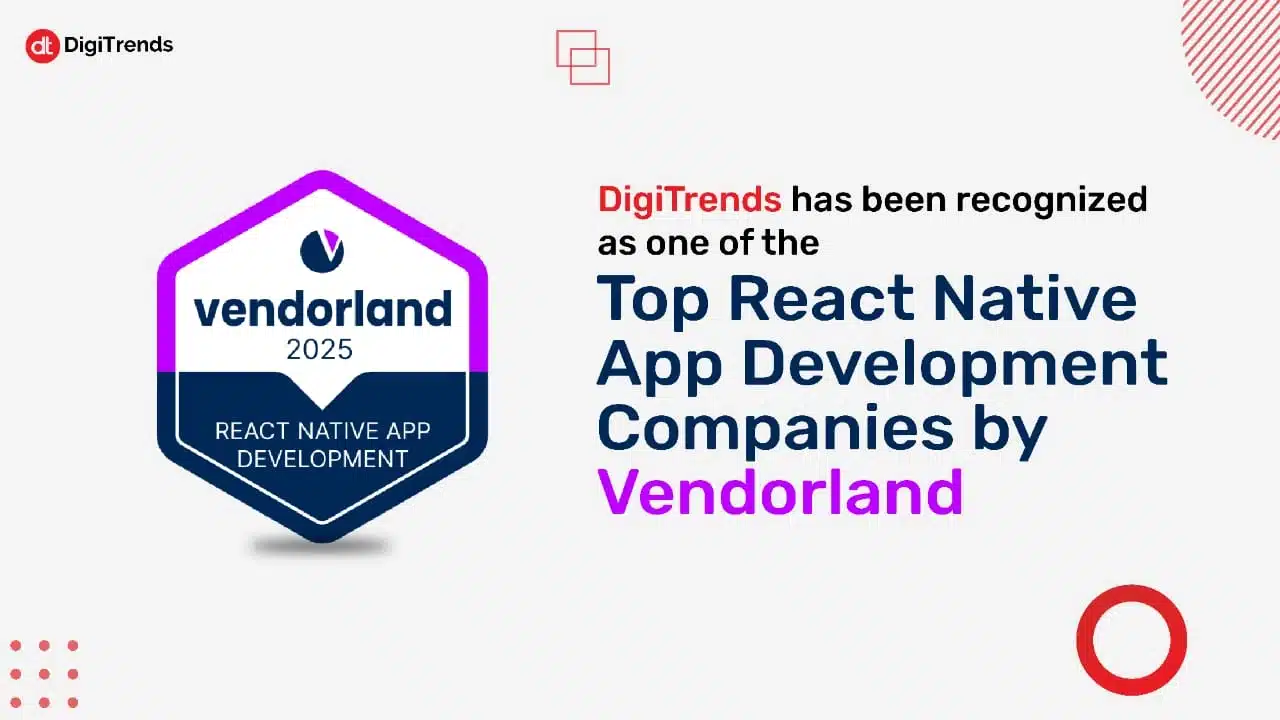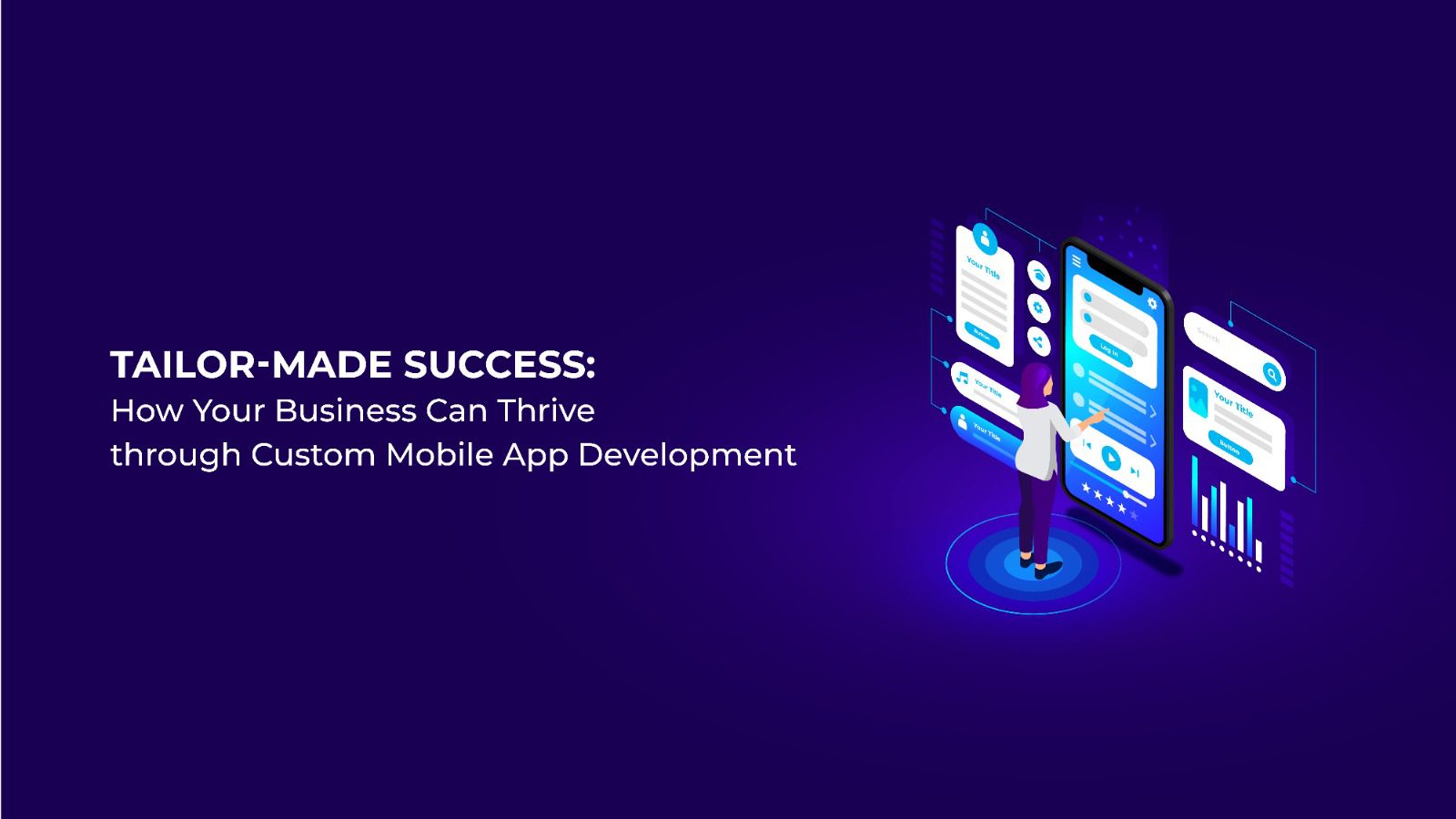
DigiTrends Recognized as a Top React Native App Development Company by Vendorland
Continue Reading

In today’s digital age, smartphones are an undeniable extension of ourselves. We use them for everything from staying connected with loved ones to managing our finances and shopping for groceries. This constant mobile engagement presents a tremendous opportunity for businesses of all sizes. A well-crafted custom mobile app development strategy can be the key to unlocking this potential and propelling your business towards success.

But with countless app options available, how do you decide which path is right for you? This blog post will delve into the world of custom mobile app development, exploring its advantages over off-the-shelf solutions and guiding you through the process of creating a mobile app that perfectly aligns with your unique business goals.
Many businesses initially consider off-the-shelf apps as a starting point. These pre-built apps are readily available for download on various app stores and can be a cost-effective solution for basic needs. Popular examples include apps for task management, point-of-sale systems, and social media scheduling. However, off-the-shelf apps come with limitations. They often lack the customization needed to truly address your specific business needs and target audience
This is where custom mobile app development services come into play. Custom mobile apps are built from the ground up to meet the specific requirements and functionalities of your business. They offer unparalleled flexibility and can be tailored to integrate seamlessly with your existing systems and workflows. Let’s explore some of the compelling benefits of custom mobile app development for businesses.
Custom mobile app development empowers businesses to create a unique digital presence that perfectly reflects their brand identity and resonates with their target audience. Unlike off-the-shelf apps, custom apps can be designed to:
A custom app can address your company’s unique challenges and goals. For example, a retail clothing store might develop an app that allows customers to browse the latest collections, virtually try on clothes using augmented reality, and schedule appointments with stylists – functionalities simply not available in a generic shopping app.
A well-designed custom app can provide a seamless and engaging user experience. This can include features like personalized product recommendations, loyalty programs with exclusive rewards, and easy-to-use in-app purchase options.

Custom apps can foster stronger relationships with your customers by providing them with a direct line of communication with your brand. Push notifications can be used to keep users informed about new products, promotions, and special events. The app can also serve as a platform to gather valuable customer feedback, allowing you to continuously improve your offerings and user experience.
Custom mobile apps can streamline internal operations and boost employee productivity. Imagine a custom app for your sales team that allows them to access customer data, track leads, and process orders while on the go. This eliminates the need for bulky laptops and paperwork, empowering your team to work smarter, not harder.
Custom apps provide businesses with rich data and analytics that can be used to gain deeper insights into customer behavior and preferences. This data can inform future marketing campaigns, product development strategies, and overall business decisions.
Custom mobile apps can open doors to entirely new revenue streams for your business. For instance, a fitness center could develop an app that allows users to book classes, purchase personalized workout plans, and access exclusive video content – all with in-app purchases. The possibilities are truly endless!
Custom mobile app development is not limited to a single industry. Businesses of all sizes and across various sectors can leverage the power of custom apps to achieve their unique goals. Here are a few examples:

Custom e-commerce apps can streamline the online shopping experience with functionalities like easy product search, secure one-click checkout options, real-time order tracking, and integrated wishlists. (e.g., Amazon app, eBay app)
Custom mobile banking apps allow users to securely manage their fintech needs on the go. Features can include mobile deposits, bill payments, fund transfers, account balance monitoring, and personalized financial management tools. (e.g., Chase Mobile app, Bank of America Mobile Banking app)
Custom healthcare apps can provide patients with convenient access to medical records, appointment scheduling, prescription refills, lab results, and secure communication with doctors. (e.g., MyChart by Epic, Zocdoc app)
Custom education apps can enhance the learning experience for students by offering interactive course materials, quizzes and assessments, personalized learning pathways, and collaborative learning tools. (e.g., Duolingo app, Khan Academy Kids app)
Having a clear vision and a well-defined plan are essential for a successful custom mobile app development project. Here are some key factors to consider:
Before diving headfirst into development, take a step back and clearly define your business goals and target audience. Here are some questions to ask yourself:
By answering these questions, you can develop a clear roadmap for your app development project. This will ensure that the final product aligns with your overall business strategy and delivers value to your target audience.
The custom mobile app development process typically involves several key stages:

Selecting the right custom mobile app development company is crucial for the success of your project. Here are some factors to consider when making your decision:

The cost of developing a custom mobile app can vary depending on several factors, including:

While a budget-friendly option might be tempting, it’s important to prioritize quality and choose a development team with the necessary expertise to deliver a robust and successful app.
Custom mobile app development offers a powerful approach for businesses to reach new audiences, enhance customer engagement, and drive growth.
By carefully defining your needs, selecting the right development partner, and implementing a data-driven approach to ongoing maintenance and updates, you can ensure your custom mobile app becomes a valuable asset for your business.